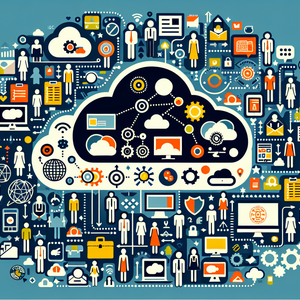The Future of Work at Expana: Trends and Predictions

The COVID-19 pandemic has fundamentally changed how companies approach remote work. Expana's transition to remote work was swift and effective, showcasing the company’s adaptability. With a robust digital infrastructure already in place, employees were able to maintain productivity without missing a beat. Expana’s remote work policy is designed to provide flexibility while ensuring accountability. Employees can choose to work from home or in the office, depending on their roles and personal preferences. This hybrid model accommodates diverse working styles and empowers employees to maintain a work-life balance. For instance, Sarah, a project manager at Expana, shares, “Being able to work from home has allowed me to tailor my environment to what I need to be productive, and I feel more motivated and engaged.” This approach aligns with a broader trend in the workforce where companies are recognizing that flexible work environments can lead to higher employee satisfaction and retention rates.
Flexible Schedules: Empowering Employees
In addition to remote work, Expana has implemented flexible scheduling to meet the needs of its workforce. The traditional 9-to-5 model is being replaced by customized work hours that align with employees’ peaks of productivity and personal commitments. This shift is particularly beneficial for those balancing family responsibilities or pursuing further education. John, a software engineer at Expana, highlights the advantages of this flexibility: “I can start my day earlier or later based on my personal commitments, which means I can focus better when I’m working. It’s all about quality over quantity for me.” This approach not only enhances employee satisfaction but also boosts overall productivity, as individuals are empowered to work when they are most effective. Furthermore, Expana’s commitment to employee well-being signals a shift in how companies view productivity, emphasizing results over hours spent in front of a screen.
Emerging Technologies: Shaping the Future
Technology is a key driver of change in the workplace, and Expana is committed to leveraging new tools to enhance collaboration, communication, and efficiency. The adoption of artificial intelligence (AI) and machine learning is revolutionizing how teams work together, allowing for smarter project management and data-driven decision-making. For example, Expana recently integrated an AI-powered project management tool that streamlines task assignments and progress tracking. This technology enables teams to collaborate seamlessly, regardless of their physical location. Emily, a marketing specialist, notes, “The new tools have transformed the way we work. We can now share updates in real-time and keep our projects on track, no matter where we are.” By investing in emerging technologies, Expana not only enhances operational efficiency but also positions itself as a leader in the competitive landscape of the tech industry.
Career Development in a Changing Landscape
As Expana embraces these trends, it is also focused on supporting employee growth and development. The company recognizes that the future of work requires continuous learning and adaptation. To this end, Expana offers various professional development programs, including online courses and mentorship opportunities, to equip employees with the skills needed for future roles. Moreover, the company’s commitment to diversity and inclusion ensures that all employees have equal access to career advancement opportunities. Expana actively promotes a culture where diverse perspectives are valued, fostering innovation and creativity across teams. This approach not only enhances employee satisfaction but also aligns with a broader societal shift towards inclusivity in the workplace.
Career Paths and Locations
Expana offers diverse career paths across a range of disciplines, including software development, marketing, project management, data analysis, and customer support. The company operates in multiple locations, including major tech hubs like San Francisco, New York, London, and Tokyo, allowing it to attract top talent from around the globe. Each office is designed to foster collaboration and innovation, equipped with state-of-the-art facilities and resources.
Products and Services
Expana provides a range of products and services that cater to various market needs, including software solutions for project management, AI-driven analytics tools, and cloud-based collaboration platforms. By continuously innovating and adapting its offerings, Expana positions itself as a key player in the tech industry, meeting the demands of a fast-paced, technology-driven market.
The future of work at Expana is not just about adapting to new trends; it’s about redefining what it means to work in a modern, dynamic environment. By embracing remote work, flexible schedules, and emerging technologies, Expana is empowering its workforce to thrive in an ever-changing landscape. As the company continues to innovate and grow, it remains committed to supporting its employees’ career development, ensuring that they are well-prepared for the challenges and opportunities that lie ahead. Expana exemplifies how organizations can successfully navigate the future of work, creating a vibrant and inclusive workplace for all. By prioritizing employee satisfaction, leveraging technology, and fostering a culture of continuous learning, Expana is paving the way for a successful and sustainable future.
Remote Project Manager
Tech companies like Expana, remote-first startups, and consulting firms
Core Responsibilities
Oversee project timelines and deliverables in a fully remote environment, ensuring alignment with team goals.
Facilitate communication and collaboration among remote teams using digital project management tools.
Manage budgets and resources, making strategic decisions to optimize project outcomes.
Required Skills
Proficiency in project management software (e.g., Asana, Trello).
Strong leadership and interpersonal skills, with experience managing remote teams.
Excellent problem-solving abilities and adaptability to changing project requirements.
AI-Powered Data Analyst
Tech firms, financial services companies, and analytics consultancies
Core Responsibilities
Analyze large datasets using machine learning tools to derive actionable insights for business decision-making.
Develop and implement predictive models to forecast trends and improve operational efficiency.
Collaborate with cross-functional teams to present data-driven recommendations.
Required Skills
Expertise in programming languages such as Python or R, and experience with data visualization tools (e.g., Tableau).
Strong analytical skills with a background in statistics or mathematics.
Knowledge of AI and machine learning frameworks (e.g., TensorFlow, Scikit-learn).
Digital Marketing Specialist (AI Focused)
Marketing agencies, tech companies, and e-commerce platforms
Core Responsibilities
Create and manage AI-driven marketing campaigns across various channels, including social media, email, and content marketing.
Utilize analytics and customer data to optimize marketing strategies and improve engagement.
Monitor and report on campaign performance, making adjustments based on real-time data.
Required Skills
Experience with SEO, SEM, and familiarity with marketing automation tools (e.g., HubSpot, Marketo).
Strong understanding of consumer behavior and digital analytics.
Creativity and innovation in developing compelling marketing content tailored to target audiences.
Cloud Solutions Architect
Cloud service providers, enterprise software companies, and IT consulting firms
Core Responsibilities
Design and implement scalable cloud architectures to support various business applications and services.
Collaborate with development teams to ensure cloud solutions align with business goals and technical requirements.
Provide technical guidance and best practices for cloud implementation and migration.
Required Skills
Deep knowledge of cloud platforms (e.g., AWS, Azure, Google Cloud).
Experience with containerization technologies (e.g., Docker, Kubernetes) and microservices architecture.
Strong troubleshooting and problem-solving skills in cloud environments.
User Experience (UX) Researcher
Tech companies, UX design agencies, and product-based organizations
Core Responsibilities
Conduct user research through surveys, interviews, and usability testing to inform product design and development.
Analyze user behavior and feedback to identify pain points and areas for improvement in user interfaces.
Collaborate with product managers and designers to create user-centered design solutions.
Required Skills
Strong understanding of UX principles, methodologies, and tools (e.g., UserTesting, Optimal Workshop).
Excellent communication skills for presenting research findings to stakeholders.
Experience in creating personas, user journey maps, and other UX documentation.


